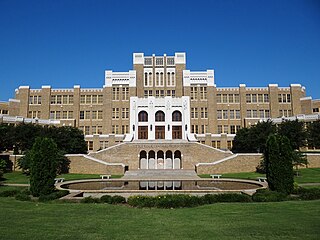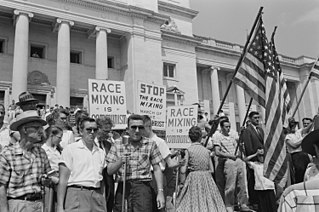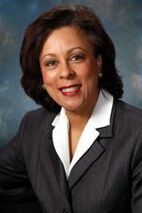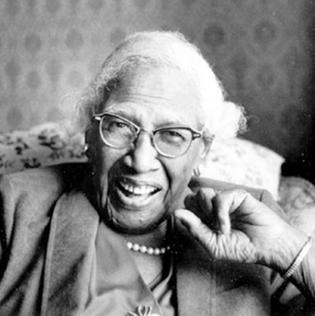Related Research Articles

Little Rock Central High School (LRCH) is an accredited comprehensive public high school in Little Rock, Arkansas, United States. The school was the site of the Little Rock Crisis in 1957 after the U.S. Supreme Court ruled that segregation by race in public schools was unconstitutional three years earlier. This was during the period of heightened activism in the civil rights movement.

Adolphine Fletcher Terry (1882–1976) was an American political and social activist in the state of Arkansas. Terry leveraged her position within the Little Rock community to affect change in causes related to social justice, women's rights, racial equality, housing, and education. Fletcher is most remembered for her role on the Women's Emergency Committee to Open Our Schools (WEC) that was primarily responsible for reopening the Little Rock, Arkansas, public school system and bringing to a close the school district closing in 1958, following the Crisis at Little Rock Central High. In its "Millennium Poll" in 2000, the Arkansas Historical Association named Terry one of the state's 15 most significant figures in state history.

The Women's Emergency Committee to Open Our Schools (WEC) was an organization formed by a group of socially prominent white women in the city of Little Rock, Arkansas during the Little Rock Crisis in 1958. The organization advocated for the integration of the Little Rock public school system and was a major obstacle to Governor Orval Faubus's efforts to prevent racial integration. The women spoke out in favor of a special election to remove segregationists from the Little Rock school board.

Ella Josephine Baker was an African-American civil rights and human rights activist. She was a largely behind-the-scenes organizer whose career spanned more than five decades. In New York City and the South, she worked alongside some of the most noted civil rights leaders of the 20th century, including W. E. B. Du Bois, Thurgood Marshall, A. Philip Randolph, and Martin Luther King Jr. She also mentored many emerging activists, such as Diane Nash, Stokely Carmichael, and Bob Moses, as leaders in the Student Nonviolent Coordinating Committee (SNCC).

Daisy Bates was an American civil rights activist, publisher, journalist, and lecturer who played a leading role in the Little Rock Integration Crisis of 1957.

Gracia M. Hillman is the former Vice President for External Affairs at Howard University in Washington, D.C. She grew up in New England, USA. She is the daughter of the late Maria DaGraca Hillman and the late George Hillman. She has two brothers, George Hillman, Jr. and Robert W. Hillman. Ms. Hillman is of Cape Verdean descent.

Eleanor Marie Smeal is an American women's rights activist. She is the president and a cofounder of the Feminist Majority Foundation and has served as president of the National Organization for Women for three terms, in addition to her work as an activist, grassroots organizer, lobbyist, and political analyst.

Dolores Clara Fernández Huerta is an American labor leader and civil rights activist who, with Cesar Chavez, is a co-founder of the United Farmworkers Association, which later merged with the Agricultural Workers Organizing Committee to become the United Farm Workers (UFW). Huerta helped organize the Delano grape strike in 1965 in California and was the lead negotiator in the workers' contract that was created after the strike.
The Women's Political Council (WPC), founded in Montgomery, Alabama, was an organization that formed in 1946 that was an early force active in the civil rights movement that was formed to address the racial issues in the city. Members included Mary Fair Burks, Jo Ann Robinson, Maude Ballou, Irene West, Thelma Glass, and Euretta Adair.
The Women's Environment & Development Organization (WEDO) is an international non-governmental organization based in New York City, U.S. that advocates women's equality in global policy. Its early successes included achieving gender equality in the final documents of Agenda 21 and the Rio Declaration. In 2006, the organization was named as an international Champion of the Earth by the United Nations Environment Programme.
People's Union for Civil Liberties (PUCL) is a human rights body formed in India in 1976 by Jayaprakash Narayan, as the People's Union for Civil Liberties and Democratic Rights (PUCLDR).
Giovanna Negretti is an American activist.
Women Engage for a Common Future (WECF), formerly known as Women in Europe for a Common Future, is a non-governmental organization created in 1994 following the 1992 Earth Summit in Rio de Janeiro. The aim of the organization is to "achieve an equitable and sustainable healthy environment for all". WECF is a network of more than 150 women's and environmental organizations in 50 countries worldwide. WECF also works on national, European, UN and international political levels with the aim to increase women's influence in political decision-making processes.
Women in conservatism in the United States have advocated for social, political, economic, and cultural conservative policies since anti-suffragism. Leading conservative women such as Phyllis Schlafly have expressed that women should embrace their privileged essential nature. This thread of belief can be traced through the anti-suffrage movement, the Red Scare, and the Reagan Era, and is still present in the 21st century, especially in several conservative women's organizations such as Concerned Women for America and the Independent Women's Forum.
Vivion Mercer Lenon Brewer was an American desegregationist, most notable for being a founding member of the Women's Emergency Committee to Open Our Schools (WEC) in 1958 during the desegregation of Central High School in Little Rock, Arkansas.

The Arkansas Women's Hall of Fame is a non-profit, volunteer organization that recognizes women who have contributed to history of the U.S. state of Arkansas.

Rosina Tucker was an American labor organizer, civil rights activist, and educator. She is best known for helping to organize the Brotherhood of Sleeping Car Porters, the first African-American trade union. At the age of one hundred, Tucker narrated a documentary about the union, Miles of Smiles, Years of Struggle.

Heather Booth is an American civil rights activist, feminist, and political strategist who has been involved in activism for progressive causes. During her student years, she was active in both the civil rights movement and feminist causes. Since then she has had a career involving feminism, community organization, and progressive politics.
Sara Alderman Murphy was a civil rights activist living in Little Rock, Arkansas during the school integration attempts in the 1950s. She was born in Wartrace, Tennessee. She earned her BA in Social Studies and English from Vanderbilt University in 1945 and a MS in Journalism from Columbia University. She was a faculty member of Northwestern State University in Natchitoches, Louisiana and then at the University of Arkansas at Little Rock. Sara Murphy joined the Women’s Emergency Committee to Open Our Schools (WEC) after the attempt to integrate Little Rock’s Central High School in 1957. She was on the WEC board in 1962 and 1963. In 1963 she founded a branch of the Panel of American Women (PAW) in Little Rock and became vice-president of the national PAW from 1971 to 1974. From 1972-1975 she was the vice-chairperson of the Governor’s Commission on the Status of Women. In 1982 she founded Peace Links, an organization to ease international tensions through discussion and personal interactions. She was the president of Arkansas’ Peace Links from 1982-1984. She wrote Breaking the Silence, a book about the role of the WEC in the Little Rock integration crisis.

Women's suffrage had early champions among men in Arkansas. Miles Ledford Langley of Arkadelphia, Arkansas proposed a women's suffrage clause during the 1868 Arkansas Constitutional Convention. Educator, James Mitchell wanted to see a world where his daughters had equal rights. The first woman's suffrage group in Arkansas was organized by Lizzie Dorman Fyler in 1881. A second women's suffrage organization was formed by Clara McDiarmid in 1888. McDiarmid was very influential on women's suffrage work in the last few decades of the nineteenth century. When she died in 1899, suffrage work slowed down, but did not all-together end. Both Bernie Babcock and Jean Vernor Jennings continued to work behind the scenes. In the 1910s, women's suffrage work began to increase again. socialist women, like Freda Hogan were very involved in women's suffrage causes. Other social activists, like Minnie Rutherford Fuller became involved in the Political Equality League (PEL) founded in 1911 by Jennings. Another statewide suffrage group, also known as the Arkansas Woman Suffrage Association (AWSA) was organized in 1914. AWSA decided to work towards helping women vote in the important primary elections in the state. The first woman to address the Arkansas General Assembly was suffragist Florence Brown Cotnam who spoke in favor of a women's suffrage amendment on February 5, 1915. While that amendment was not completely successful, Cotnam was able to persuade the Arkansas governor to hold a special legislative session in 1917. That year Arkansas women won the right to vote in primary elections. In May 1918, between 40,000 and 50,000 white women voted in the primaries. African American voters were restricted from voting in primaries in the state. Further efforts to amend the state constitution took place in 1918, but were also unsuccessful. When the Nineteenth Amendment passed the United States Congress, Arkansas held another special legislative session in July 1919. The amendment was ratified on July 28 and Arkansas became the twelfth state to ratify the Nineteenth Amendment.
References
- Bayless, Stephanie (April 1, 2010). "Mary Brown "Brownie" Williams Ledbetter (1932–2010)". The Encyclopedia of Arkansas History and Culture. Butler Center for Arkansas Studies. Retrieved 13 August 2010.
- Netterstrom, Kristin (March 23, 2010). "LR activist didn't work 'by degree' 'Brownie' Ledbetter dead at 77". Arkansas Democrat-Gazette. Retrieved 13 August 2010.[ dead link ]